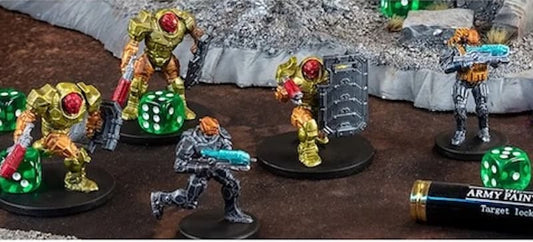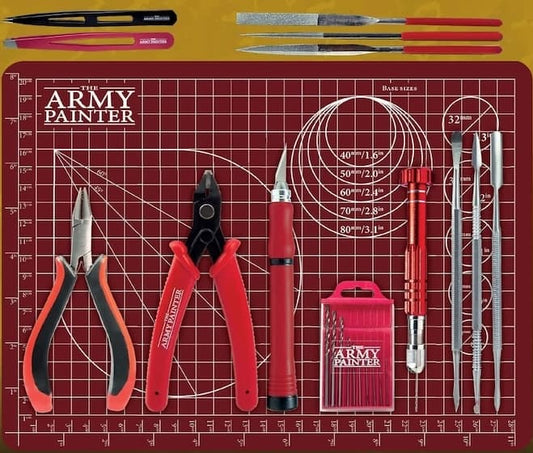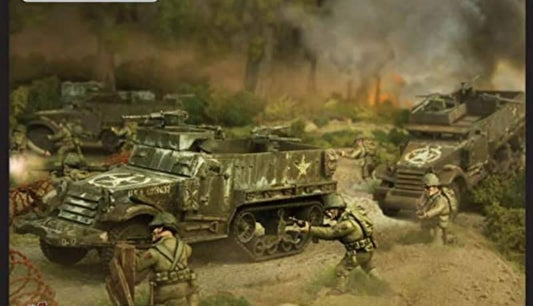Interested in miniature painting but feeling lost in the jargon? Learning the key terms can make all the difference in mastering this hobby.
We've curated a glossary of essential miniature painting terms to help you get started and improve your skills.
Mini Painting Glossary
Priming
Priming is the first step in painting a miniature, where you apply a base coat of primer to prepare the surface for paint. It helps paint stick better and shows off details more clearly.
Glazing
Glazing is when you apply a thin layer of paint over another color to slightly change its tone. Instead of covering the color, glazing just adds a subtle tint. It’s perfect for blending and adjusting shades without overpowering the base color.
Wet Blending
Wet blending involves blending two colors directly on the model while the paint is still wet. This creates a smooth gradient between the colors, making it ideal for subtle transitions or complex shading.
Highlighting
Highlighting is the process of adding lighter colors to raised areas to simulate light hitting those spots. It helps to make the details stand out and adds depth to your model.
Edge Highlighting
Edge highlighting involves painting the edges of a model with a lighter color to simulate light hitting the sharpest points. It’s a quick way to make your mini look sharper and more defined.
Dark Lining
Dark lining is when you take a tiny bit of dark paint and run it along the edges where two colors meet. It gives your mini a nice depth and helps the details pop.
Dry Brushing
Dry brushing is a quick way to bring out texture. You take a brush with almost no paint on it and lightly swipe it over the raised areas of your mini. It’s perfect for giving surfaces that worn, weathered feel.
Overbrushing
Overbrushing is similar to dry brushing but with more paint on the brush. It’s perfect for surfaces like chainmail, where you want to add a little more color without fully covering the texture.
Masking
Masking is handy for when you need crisp lines or different colors on the same surface. When using this technique, you cover parts of your model to protect them while you paint other areas. You can use tape or putty to keep paint off spots you want to keep clean.
Airbrushing
Airbrushing involves using specialized paints to spray color in a fine mist. You can use airbrush paints to cover large areas or add smooth gradients between colors.
Layering
Layering is the process of building up color, highlights, and shadows on your mini. You start with a base color and then add thin layers of paint to create depth.
Wet Palette
A wet palette is a paint setup that helps keep your paint moist while you work. It consists of a shallow container with a layer of water and a piece of parchment paper on top. This setup prevents paint from drying out too quickly.
Flecking
Flecking is a fun way to add some random splatters to your mini. You thin out your paint, grab an old toothbrush or a brush with stiff bristles, and flick the paint onto the surface for a speckled look.
Stippling
Stippling involves dabbing small dots or uneven shapes of paint onto your model. You can use a sponge, brush, or even a cloth to create texture.
Sketching
Sketching is when you apply rough layers of paint to test out colors and ideas on your mini. It’s a handy way to “preview” things before committing to the final look.
Sealing
Sealing is the process of applying a final protective coat to a finished miniature. You can do this with a spray or brush-on varnish to protect the paint from chipping and fading.
Thinning
Thinning is a term for diluting your paint with water or medium to make it more fluid. This technique helps in creating smooth layers and blending colors.
Object Source Lighting (OSL)
OSL involves painting light effects directly onto your model, as if a light source within the miniature is casting shadows and highlights on its surface. It creates a dramatic and realistic effect.
Loaded Brush
This technique involves loading your brush with two colors and blending them with a feathering motion. It takes practice but gives a smooth, natural gradient when done right.
Feathering
Feathering softly blends one color into another to create a smooth transition. It’s great for making gradients or adding highlights to your miniatures.
Sky-Earth Non-Metallic Metal (SENMM)
SENMM replicates the reflection of the sky and ground on metallic surfaces. You use colors like blue, brown, and white to create this reflective effect.
Undercoating
Undercoating is the base layer of paint applied after priming. It prepares the model for further layers, highlights, and details.
Sponging
Using a sponge to apply paint and create textured effects is sponging. It’s great for adding an organic look to surfaces.
Stippling
You can use stippling to add more texture and depth to your model. Stippling is the process of adding tiny dots or shapes of paint using a brush or sponge.
Freehand
Freehand is the art of painting designs, patterns, or details directly onto a miniature without the aid of sculpted guides. It requires a steady hand and a lot of practice but allows for unique customization.
Varnishing
Varnishing involves applying a clear protective coat over your finished model. It seals the paint job, protects it from wear and tear, and can give your mini a glossy, satin, or matte finish.
Painting Like a Pro
These are some of the essential terms to learn before painting minis. Start by familiarizing yourself with these concepts. It may be helpful to watch tutorials on techniques like glazing, dry brushing, and wet blending. With practice and the right knowledge, you'll see your skills improve in no time.
Video
Infographic
Interested in miniature painting but confused by the terminology? Familiarizing yourself with key terms can enhance your skills. Check out this infographic for essential terms to get you started.




